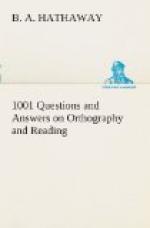61. What is the origin of the word
English?
It is derived from the word Angles.
62. Who were the Angles?
They were a tribe of people who came from
the land of the Low
Germans
and settled in Britain in the fifth century.
63. What does the word England mean?
“The land of the Angles.”
64. Why is our language sometimes called
the “Teutonic language"?
Because it is derived from the ancient
Germans, who were called
Teutons.
65. What kind of words end in ize?
Verbs derived from the Greek.
66. What kind of words end in ise?
Most words derived from the French.
67. Why is the English called a Composite
Language?
Because it is derived from so many different
sources.
68. Does adding a single consonant
to a word ever make an
additional
syllable?
It does.
69. Give examples.
Grade, grad-ed; confide, con-fi-ded.
70. Can a word be compound and derivative
at the same time?
It can; as, ball-player.
71. How distinguish between an affix
and a part of a compound
word?
If all the parts retain their literal
signification they form
a
compound; if not, the part which loses its signification
becomes
an affix in a derivative.
72. Is the word outside compound or
derivative?
It is compound.
73. Is the word outrun compound or
derivative?
It is derivative.
74. What is Derivation?
That branch of etymology which treats
of the sources of the words
of
a language.
75. How many kinds of Derivation?
Two.
76. What are they?
Paronymous and Historical.
77. What is Paronymous derivation?
That part of etymology which treats of
present sources of English
words.
78. Give examples of Paronymous derivation.
Kingdom, from king; Manly, from man, etc.
79. What is Historical derivation?
That part of etymology which treats of
the foreign sources of the
English
language.
80. Give examples of Historical derivation.
Book, from boc; Moon, from mona, etc.
81. When use a, and when an, in a sentence?
Use a before all words beginning with
a consonant sound, and
use
an before words beginning with a vowel sound,
h
mute, or h initial, if the accent is on any
other
syllable
than the first.
82. Why do words in the English language
become obsolete?
Because it is a living language.
83. What is a new word?
One that has recently come into use.




